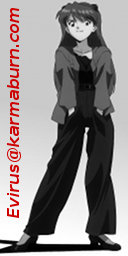|
|
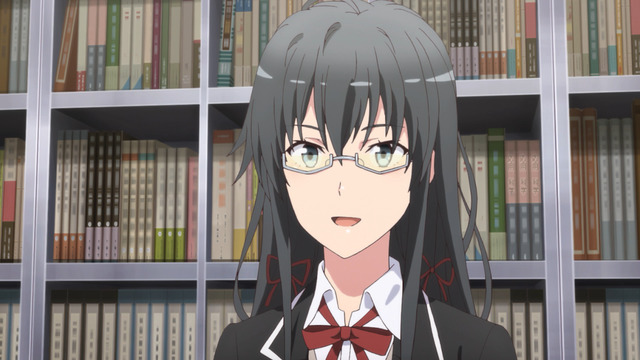
I wonder if sales of blue-blocking computer glasses are down
now that you can just enable night mode on basically any OS.
I gave Oregairu a second chance in anticipation of Yahari Ore no Seishun Love Comedy wa Machigatteiru. Kan (My Teen Romantic Comedy SNAFU Climax!) completing the series this season. I'm glad this worked out a lot better this time than when I watched Shakugan no Shana II so I could watch Shakugan no Shana III. (Shana II is not great.) Through four episodes, the conclusion of Oregairu III contains the sort of emotional resonance you ought to expect by now if you've been following the previous seasons.
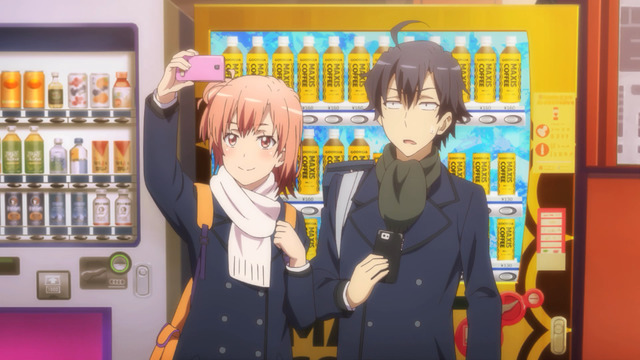
Kids and their selfies.
It's a difficult balancing act, to be sure, capturing the stakes in a way that makes us care about the outcome without swinging too far into melodrama. Still, I'm only about 80-percent sure that this season will cover the source material's conclusion. I mean, I have at least heard that this is the case. But not having read the light novels, I'm a little unsure how the series will manage to wrap things up within the remaining episodes. My guess is that some characters just won't get covered to the satisfaction of their more ardent fans.
Posted in Yahari Ore no Seishun Love Comedy wa Machigatteiru. Kan | Tags: Boys Love, Harem Comedy, Light Novels, Season Introduction, Summer 2020, Unrequited Love | Permanent Link
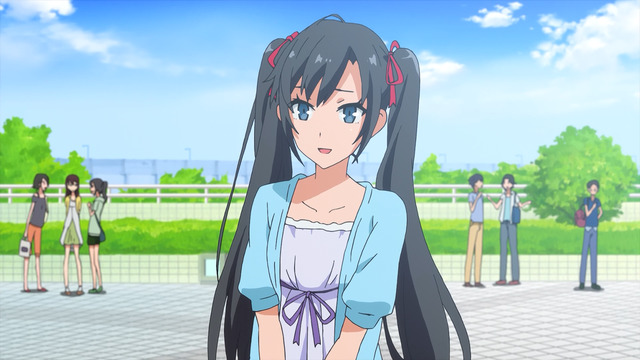
Yukino, those twintails are wearing you.
I dropped the first season of Yahari Ore no Seishun Rabukome wa Machigatteiru. (localized as My Youth Romantic Comedy Is Wrong, As I Expected and My Teen Romantic Comedy SNAFU, but also known simply as Oregairu) after three episodes seven years ago. However, the series has a lot of fans who insist it's really good, and its third season does start in a few weeks, so I figured it deserved another try. I've finished the first season now, but most of my complaints from 2013 still hold.
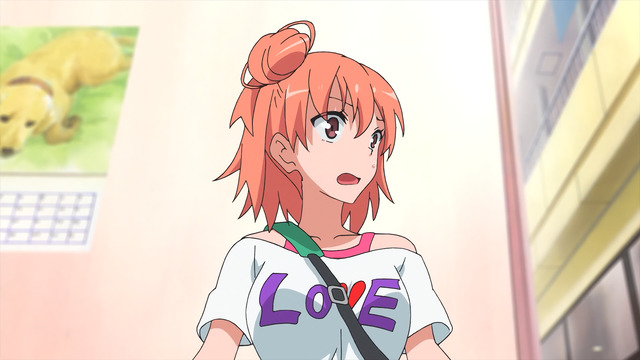
Yui is a fraud. That hair ball is a clip-on. Also, unrelatedly, she is bad at dogs.
Hachiman and Yukino simply aren't endearing characters. Maybe they appeal to viewers who identify with them. I guess Yui is okay, but I'm mostly ambivalent about her. One thing I will give the show credit for is its portrayal of the popular kids. Instead of being backstabbing sadists like you'll typically find in anime school cliques, it's pretty obvious why their classmates gravitate toward Hayato and Yumiko.

This one kid who appeared in two episodes is a better character than most of the regular cast.
Unfortunately, Oregairu also has entirely worthless characters as well. Specifically, the chuuni guy never stopped being annoying, and the fujoshi literally has no scenes or dialogue that don't involve screaming about boys love. These two characters could not be any more one-note if you tried, and they really drag down the rest of the show, especially when the episode is trying to say something insightful about relationships or the challenges facing students who feel as if they don't fit in with their classmates or what society expects of them.
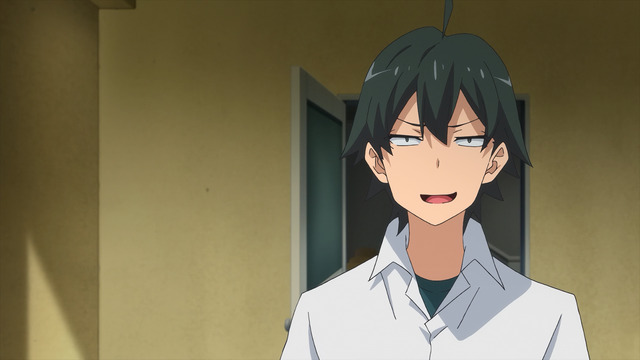
I hope those who compared Hachiman to Batman while Oregairu was airing were doing so in jest.
I'm hoping the second season will be much better, because so far I'm entirely unimpressed with Oregairu. At least the second season (Yahari Ore no Seishun Love Comedy wa Machigatteiru. Zoku) adds Iroha to the cast. Granted, literally everything I know about Iroha comes from this video on the YouTube, but she also seems more popular than either Yukino or Yui, so presumably she has something going for her. Granted, that's sort of a low bar to clear considering how unimpressed I am by the show's two main girls so far. Really, the one to beat is Komachi, Hachiman's surprisingly reliable kid sister. She has her shit together and is clearly more intelligent than her brother, at least.
Posted in Yahari Ore no Seishun Love Come wa Machigatteiru | Tags: Boys Love, Fat Anime Characters, Hair, Harem Comedy, Inoue Marina, Light Novels, Spring 2013 | Permanent Link
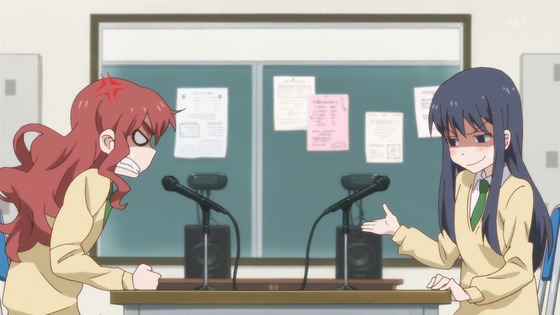
I heard Love Line started out basically the same way.
Love Lab is about a student council at a girls' school that secretly dedicates itself on the side to the art of pursuing boys. Genshiken Nidaime harks the return of a college circle dedicated to the artistic pursuits of anime, manga, and video games. Although I thoroughly enjoyed the first anime adaptation of the Genshiken manga when it aired in 2004, I did not say much about it at the time. Since then, the series spawned a number of OVA and a second television season, making Genshiken Nidaime the third or fourth season rather than the second part, depending on how you count it. (A quirk the anime itself acknowledges.) Love Lab is newer on the scene; it's the first anime adaptation of an ongoing manga (Renai Lab) that has run since 2006.
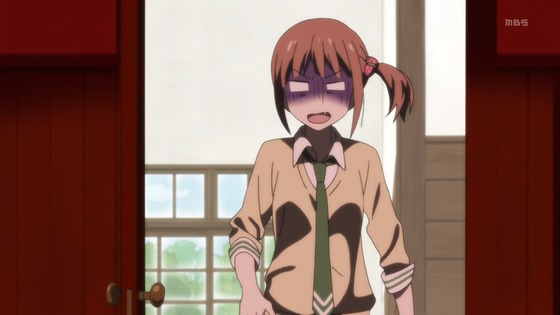
It does not appear as if Riko was prepared for this..
I'm finding Love Lab tough to sell, but easy to enjoy. This is mostly because the series doesn't sound like much from its description, but the execution is excellent. The jokes are funny and the characters are likable. One aspect I haven't quite gotten my head around is casting Numakura Manami as Riko. I associate her voice so much with her character Hibiki from iDOLM@STER that it's hard to accept her as anyone else. The best solution, obviously, would be to re-work Riko's character design to actually look like Hibiki so I could pretend Numakura Manami is voicing Ganaha Hibiki the 765PRO idol in a starring role portraying Riko in a production of a Love Lab television show broadcast within the iDOLM@STER universe. (I'm only partly kidding.)
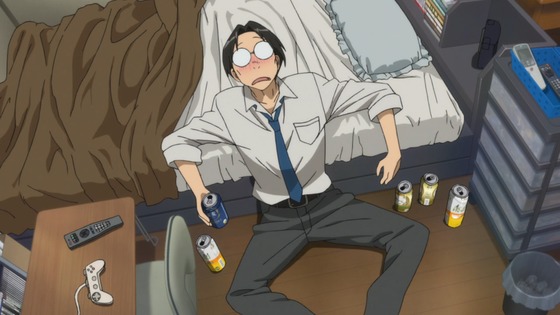
Drinking alone.
Speaking of seiyuu, Genshiken Nidaime replaced basically every voice actor from the previous anime adaptations. I could sort of understand if the intent was to replace them with brand new talent, but as that doesn't appear to be the case at all, I find the change rather perplexing. It's also quite jarring to hear completely different voices from what I'm accustomed to, even though it's been a few years since I last watched any Genshiken. In particular, replacing Kawasumi Ayako with Yukana has been quite difficult to accept even though I like Yukana quite a bit. Madarame's new deeper voice also takes some getting used to.
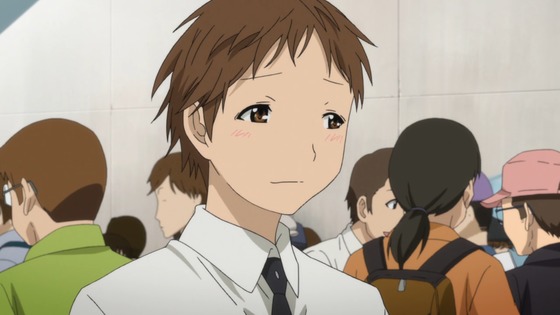
Hato not in drag.
Some fans of the original Genshiken anime expressed disappointment with Nidaime because the Genshiken club itself has changed. Previously a boys' club of openly geeky males, it has transformed over the years to one dominated by fujoshi members and their pursuit of male-on-male erotica while the alumni and their interests are presented as more incidental to to the main plot. Naturally, this is because the old members are no longer students, thus no longer part of the club, and likewise occupied by other "grown-up" interests as their original fervor wanes.
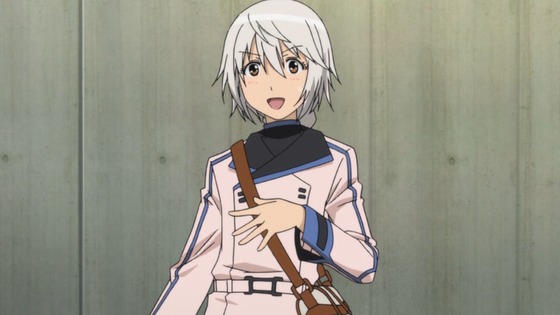
It's a boy dressed as a girl pretending to be a boy.
Nevertheless, Genshiken Nidaime appears to be just as much about personal growth and acceptance as it has always been. The first season focused on Sasahara as he grew more comfortable with embracing his otaku side, and on Saki as she discovered she could still love one otaku in particular (Kousaka) while still loathing otaku in general. Later, Genshiken focused on Ogiue as she came to came to grips with her identity and the parts of her life that previously mortified her. Although I have not read ahead in the manga, it appears Genshiken Nidaime will focus on the cross-dressing Hato as he deals with the challenges of being a straight male (allegedly) who masturbates to yaoi (i.e., 2D gay porn).
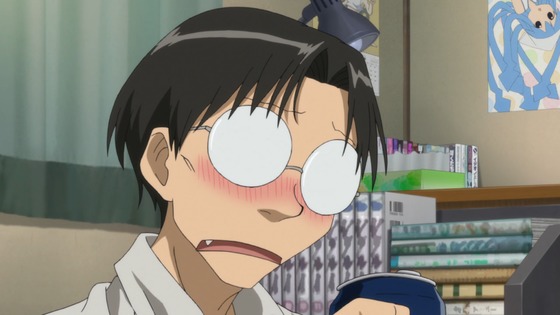
Being a grown-up is hard.
Notably, it appears this season will also spotlight Madarame. This former club president (now three terms removed from the current head, Ogiue), was previously depicted as the savvy, veteran otaku who was completely comfortable with being who he was. However, he clearly still carries a torch for the Genshiken Best Girl, Saki (previously Yukino Satsuki, now sorely missed despite Satou Rina's talents), and he refuses to publicly acknowledge this most heinous of perversions: Attraction to a three-dimensional woman. In this regard, perhaps Madarame has the most growing up to do.
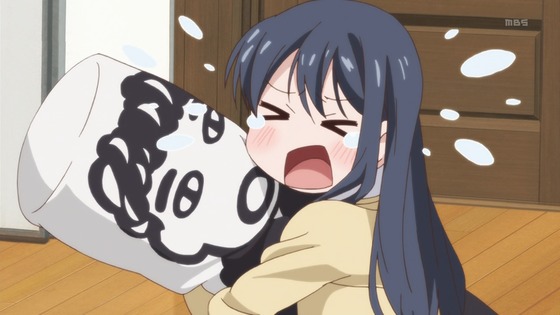
Good luck, Maki's future boyfriend.
Through five episodes, Love Lab is better than Genshiken Nidaime, but I suspect that the latter will be better remembered years later if both shows continue to progress as they have. I suspect Genshiken resonates more with aging male anime fans, even though this season is mostly comprised of female characters. Incidentally, if you know anything about Genshiken, you should already know Ogiue Maniax is its leading resource 'round these parts.
Posted in BEST GIRL, Genshiken Nidaime, iDOLM@STER, THE, Love Lab, Season Summary, Seiyuu | Tags: Boys Love, Season Introduction, Summer 2013, Yukana | Permanent Link
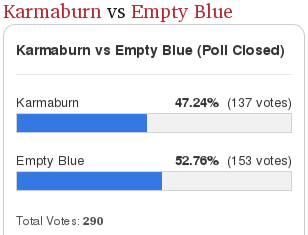
(I think I received the majority of the last 250 votes though.)
I've been eliminated from this year's Aniblog Tourney. Although the contest was not as lopsided as my first Aniblog Tourney loss, a contributing factor to both defeats was likely my staunch refusal to self-promote for it or for the blog in general. I have been updating this blog alone since approximately 1999. I have never included any advertising (except for the compulsory Geocities ones before I started paying for hosting. And despite moving the blog to WordPress in 2006, I've never enabled comments, an omission that perplexes some readers. As Ani-nouto can attest, some readers find blogs with disabled comments hostile and anti-social. However, I've nearly always posted contact information, and there's even a Twitter button available. Nobody ever uses the Twitter button, but I do get viewer mail on occasion.
The most recent letter comes from from Doomguin who writes:
I don't know if you've seen [Princess Princess] or heard of it or not, but the show is by Studio Deen, and it's about a boy, Toru Kouno, transfers to an all-boys high school, and after some odd treatment, is convinced to become one of the school's, now three, "Princesses". It turns out that because it is an all-boys school, it has become a tradition to select the students who are bishonen, and have them dress up a girls to keep the female-starved student body's morale up.
It has all the makings of a BL, but isn't and has a lot of fun with that fact. I recommend it if you have not seen it before, and I think it also falls into that little niche of shows that people don't generally think of (or have heard of, for that matter), and didn't get a lot of attention, but still good and enjoyable.
I have, in fact, heard of Princess Princess, but despite Doomguin's recommendation, I don't think I'll be watching it. Miracle Train aside, it doesn't sound like the sort of show I usually watch.
[Update: Yes, I'm messing with the CSS. Yes, it looks like ass. Yes, I'll probably lose interest before actually fixing anything, leaving the entire site in a terrible state, just as I've all but abandoned efforts to integrate the pre-2006 reviews on the left column into the WordPress categories on the right. No, I can't believe people still maximize browsers in this day and age. No, I haven't tested this at all in any version of Internet Explorer.]
Posted in Meta, Viewer Mail | Tags: Blogs about Blogs, Boys Love | Permanent Link

Are you crying? There's no crying in baseball!
I tried to marathon the first Ookiku Furikabutte (A.K.A. Big Windup!) so I could start following the currently airing second season, but this show is unwatchable. This is not to say that Ookiku Furikabutte is a bad show, it's just annoying as all Hell. I can see how a lot of people might really enjoy Big Windup! and recommend it enthusiastically, but these are people with much higher tolerances for crying in their anime than me.
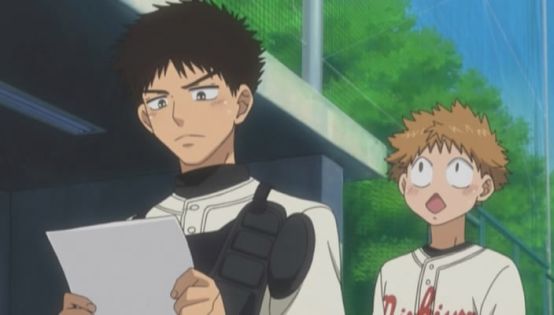
I call Mihashi "Chicken Face" because I can never remember his name.
Also he won't stop making this stupid beak-mouth expression.
I managed to finish the first nine episodes, and I think on average there must be four or five unrelated crying scenes in each episode. These boys cry over everything. Usually it's Chicken Face...err, Mihashi, who cries, because he cries all the time. Presumably it's to show character development and maybe by the end of the season he (hopefully) develops a spine and some sand, but I'll be Haruhi damned if you think I'm going to stick around to find out. Sack up, guys.
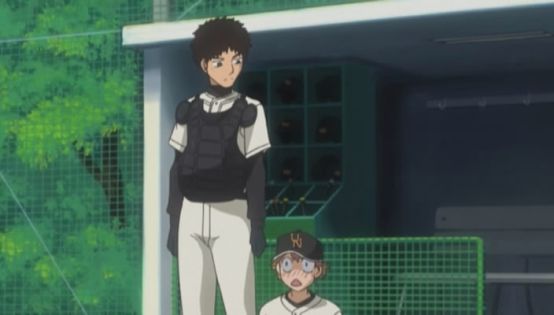
If catchers had aprons this pitcher would be clinging to one.
I'm okay with the latent homosexual content. (There is A LOT of latent homosexual content. [SPOILERS] This is basically Boys Love without the bishies.) I did watch Miracle Train, after all, and the husband/wife relationship between the pitcher and the catcher is played up quite often during baseball-themed shows (including Major and Taisho Yakyuu Musume, among others). That is to be expected. However, I am not okay with Chicken Face's paralyzing anxieties and complete lack of self-confidence. (By the way, it turns out Miracle Train isn't really gay at all.)
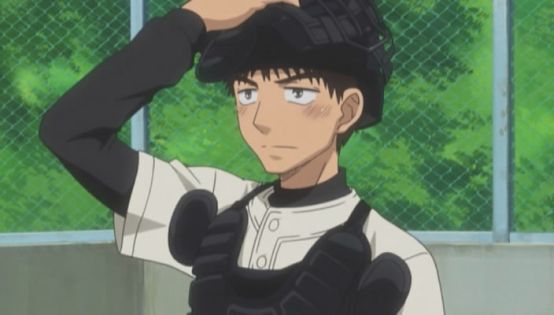
For a guy in the process of learning his new boyfriend is
a timid little girl, Abe is taking this rather well.
Ookiku Furikabutte is not all bad, though. For example, all the parts with Abe calling a smart game accurately reflect the thought processes that separate pitching from throwing. Thankfully, unlike One Outs, Big Windup! accomplishes this without pretending commonplace baseball strategies and tricks are shocking and amazing, even though they might seem so to neophyte spectators. If Ookiku Furikabutte cut the lousy drama queens or at least traded them for some "players to be named later," it could field a pretty decent baseball anime with the rest of the team, alas.
Posted in Miracle Train, One Outs, Ookiku Furikabutte | Tags: baseball, Boys Love, Characters in Need of Better Shows, Crying, Dropped Shows, Spring 2010 | Permanent Link
|
|




